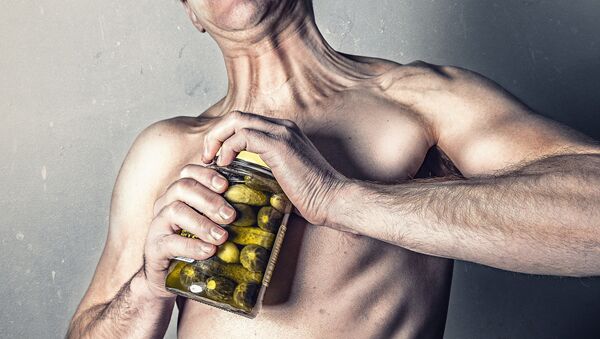According to the YouGov poll, only two percent of young Britons aged between 18 and 24 considered themselves to be completely masculine, with 42 percent of respondents saying the word "masculinity" gave them a negative impression.
British men are far less likely to identify as completely masculine than American men – https://t.co/rnQmdIbqSq pic.twitter.com/wsV3X5FZ5A
— YouGov (@YouGov) May 13, 2016
These figures were contrasted with older Britons, as 56 percent of over 65 year olds described themselves as completely masculine, while out of this age bracket, only 11 percent thought the word "masculinity" had negative connotations.
What is Masculinity?
This vast contrast in attitudes towards the term has led many to question what has happened to modern masculinity. However Dr Christopher R. Matthews, senior lecturer from the University of Brighton, told Sputnik that such an approach to the broad concept of masculinity was "problematic."
✨ Jamie Fraser is the perfect man. He's Scottish, strong, handsome, and he's got some damn amazing curls pic.twitter.com/OUA48qXWMv
— Sarah ♕ (@MysteryWriter_) May 13, 2016
"The idea you have to start with is: what is masculine?" he said, arguing that there is no clear definition of masculinity in modern society.
"These ideas connected to gender are far more fluid. Therefore, it's very easy for one person to think that fighting is masculine, but then another to think that a rejection of fighting is also masculine," Dr Matthews told Sputnik.
"There is a variety of research that shows the idea of masculinity defined in multiple different ways — it has broadened dramatically. What it means to be a man, how men identify, stories about what men are, have increased and become more fluid, less static."
Nice quote f @TimDSamuels "Raised on a diet of Bond and Bourne [men are] set loose to hunt in a world of PowerPoint + 360-degree evaluations
— Alex Krasodomski (@akrasodomski) May 18, 2016
Why Are Things Changing?
While older generations were more likely to identify themselves as being masculine, there was an increasing reluctance from younger people to do so, with Dr Matthews saying that a series of social factors over time had challenged the traditional concept of masculinity — often epitomized by physical toughness and strength.
Is it wrong to wish to be in this GIf with Daniel Craig? #007 #JamesBond #spectre pic.twitter.com/Z1FHPZboBD
— Helen 2.0 (@wirdbyrd) April 12, 2016
"The first is changes in the way people work. You can look at this historically and look at women being drawn into the workplace and that eroding of what were traditional men's spaces," Dr Matthews told Sputnik.
Crisis of masculinity in emoji (from Xu Bing's Book from the Ground) pic.twitter.com/52JZ6i0cFC
— Ty is Typing (@TylerCallich) May 18, 2016
"You can also look at broader equality movements within society that have broken down the deconstructed patriarchy in a variety of different ways, which means that men no longer assume power.
"So, if men no longer assume power, and they no longer assume a certain sort of job, and they no longer assume the head of a family, then it becomes far more fluid as to what men are and should be."
Masculinity — a Dirty Word?
This challenging of masculinity has also led to a seemingly negative backlash against the word itself, with suggestions 'masculinity' is becoming a 'dirty word' for younger generations.
Researchers have suggested this may stem from younger people's rejection of the traditionally-held physical, patriarchal notions of masculinity.
Macho Man! #superheroday @Visualsoft @ScottGShore https://t.co/M8VASkJw6T pic.twitter.com/fQye8oLpI4
— TFM (@TFMradio) May 13, 2016
Dr Mark McCormack, senior lecturer in sociology from Durham University, told Sputnik the concept of masculinity holds many negative connotations for young people today.
"For many young men, their behavior and the way they view their gender has changed, but the idea of masculinity hasn't, so there's been a disconnect," Dr McCormack told Sputnik.
Fascinating data on trends in masculinity — and how young people increasingly dislike the concept https://t.co/cfH9MPZDS0
— Mark McCormack (@_MarkMcCormack) May 18, 2016
"They still think of masculinity as the muscles, the macho, the fights and all of that stuff, but that's just not something they want to do themselves. So if you ask someone: 'what does it mean to be a man today?' you'll get different answers to if you ask: 'what is masculinity?' because they still think of masculinity as this stereotypical thing versus how they live their lives as men."
Here's me on an OHP playing around with representations to help students think about the #commodification of #bodies pic.twitter.com/bVNFjk63zu
— Christopher Matthews (@DrCRMatthews) April 28, 2016
He also believes it is linked to an increasing acceptance of people of different sexual orientations.
"In the 80s and 90s, the way to show you were macho, was to be homophobic, because by proving you weren't gay, you were proving you weren't feminine. It was kind of a two-for-one — proving your straightness and your masculinity. Now, as homophobia has decreased, guys don't need to do these things to be macho anymore."
Changing Terms?
While there is still wide and varied debate about what the term masculinity means in 2016, Dr Matthews says referring to such things as being either masculine or feminine can be counterproductive.
WHO GIF'D THIS WHY DID THEY WANNA KILL ME DO YOU SEE HIS FRIGGING MUSCLES OH MY GODDDDDDDDDDDD pic.twitter.com/bkLyO9heRL
— Dominique (@parisbound13) May 3, 2016
He told Sputnik that many people would benefit from removing the "historical legacy" of such terms.
"The terms masculinity and femininity immediately set us up down these paths, and a far more effective way of dealing with it is to stop using those terms as much as possible and realize that we're people — we're human beings," Dr Matthews said.




